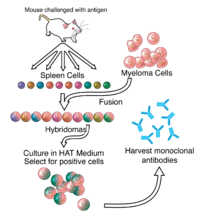
Therapeutic drug monitoring of monoclonal antibodies: Applicability based on their pharmacokinetic properties.
Sign Up to like & getrecommendations! Published in 2019 at "Drug metabolism and pharmacokinetics"
DOI: 10.1016/j.dmpk.2018.11.003
Abstract: Monoclonal antibodies (mAbs) have dramatically improved clinical outcomes for inflammatory and malignant diseases. The elimination route of mAbs is cellular uptake by nonspecific pinocytosis or receptor-mediated endocytosis followed by proteolytic degradation which is protected by… read more here.
Keywords: monoclonal antibodies; mabs; drug; therapeutic drug ... See more keywords

Characterisation of monoclonal antibodies specific for hamster leukocyte differentiation molecules
Sign Up to like & getrecommendations! Published in 2017 at "Veterinary Immunology and Immunopathology"
DOI: 10.1016/j.vetimm.2016.12.003
Abstract: Flow cytometry was used to identify mAbs that recognize conserved epitopes on hamster leukocyte differentiation molecules (hLDM) and also to characterize mAbs developed against hLDM. Initial screening of mAbs developed against LDMs in other species… read more here.
Keywords: differentiation molecules; leukocyte differentiation; mabs; hamster ... See more keywords

MarR-Dependent Transcriptional Regulation of mmpSL5 Induces Ethionamide Resistance in Mycobacterium abscessus
Sign Up to like & getrecommendations! Published in 2022 at "Antimicrobial Agents and Chemotherapy"
DOI: 10.1128/aac.01350-22
Abstract: Mycobacterium abscessus (Mabs) is an emerging nontuberculosis mycobacterial (NTM) pathogen responsible for a wide variety of respiratory and cutaneous infections that are difficult to treat with standard antibacterial therapy. Mabs has a high degree of… read more here.
Keywords: mab 2648c; mabs; resistance; mycobacterium abscessus ... See more keywords

Mechanisms of action of monoclonal antibodies in oncology integrated in IMGT/mAb-DB
Sign Up to like & getrecommendations! Published in 2023 at "Frontiers in Immunology"
DOI: 10.3389/fimmu.2023.1129323
Abstract: Background Cancer cells activate different immune checkpoint (IC) pathways in order to evade immunosurveillance. Immunotherapies involving ICs either block or stimulate these pathways and enhance the efficiency of the immune system to recognize and attack… read more here.
Keywords: oncology; mabs; mabs targeting; imgt mab ... See more keywords

Isolation of Two Novel Human Anti-CTLA-4 mAbs with Intriguing Biological Properties on Tumor and NK Cells
Sign Up to like & getrecommendations! Published in 2020 at "Cancers"
DOI: 10.3390/cancers12082204
Abstract: The cytotoxic T lymphocyte-antigen 4 (CTLA-4) has been considered an IC exclusively expressed on T cells, where it counteracts the co-stimulatory CD28 receptor, by competing for its binding to CD-80 and CD-86. We recently found… read more here.
Keywords: novel human; mabs; ctla; human mouse ... See more keywords